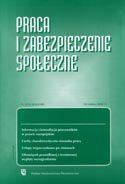Decommunization of the civil service and state offices
The aim of the paper is to analyze the provisions on the decommunization of the civil service and state offices, introduced in the Act of 14 April 2023 on the Amendment of the Civil Service Act and Certain Other Acts. I present three claims. First, I argue that the said provisions are another step in an ongoing change of the Polish lustration model from an instrument of historical clarification, in which sanctions are imposed only for submitting a false lustration statement, towards a retribution mechanism, where those connected with the former regime cannot hold public offices. Second, I claim that these provisions violate both the Polish Constitution and international law. Finally, I suggest that labour courts ought to refuse to apply said provisions, should they face compensation claims or claims for reinstatement in a job position.
References
Czarnota, A. (2007). The Politics of the Lustration Law in Poland, 1989–2006. W: A. Mayer-Rieckh i P. de Greiff (Red.). Justice as Prevention: Vetting Public Employees in Transitional Societies. Social Science Research Council, 222–258.
European Commission for Democracy through Law (2015). Final Opinion on the Law on Government Cleansing (Lustration Law) of Ukraine, CDL-AD(2015)012.
Garlicki, L. (2016). Sądy a Konstytucja Rzeczypospolitej Polskiej. Przegląd Sądowy, 7–8, 7–25.
Grabarczyk, M. (2021). Pasikowski's 'Pigs' as an Illustration of Vetting in a Transitional Society. Archiwum Filozofii Prawa i Filozofii Społecznej, 26(1), 100–111.
Grzegorczyk, P. (2006). Skutki wyroków Europejskiego Trybunału Praw Człowieka w krajowym porządku prawnym. Przegląd Sądowy 6, 3–42.
Hermann, M. (2012). Derogacja w analizach teoretycznoprawnych. Ars boni et aequi.
Kaczyński, J. (2011). Polska naszych marzeń. Akapit.
Koncewicz, T.T. (2016). "Emergency Constitutional Review": thinking the unthinkable? A Letter from America. VerfBlog, 29.03.2016, https://verfassungsblog.de/emergency-constitutional-review-thinking-the-unthinkable-a-letter-from-america/
Kosař, D. (2008). Lustration and Lapse of Time Dealing with the Past in the Czech Republic. European Constitutional Law Review, 4, 460–487.
Krotoszyński, M. (2015). Ustawodawstwo lustracyjne wobec upływu czasu. Forum Prawnicze, 6, 83–100.
Krotoszyński, M. (2017). Modele sprawiedliwości tranzycyjnej. Wydawnictwo Naukowe UAM.
Krotoszyński, M. (2021). Lustracja w Polsce po 2015 r. Zmiana modelu i problemy konstytucyjne. Przegląd Konstytucyjny, 4, 116–142.
Mikuli, P. (2018). Doktryna konieczności jako uzasadnienie dla rozproszonej kontroli konstytucyjności ustaw Polsce. Gdańskie Studia Prawnicze, 40, 635–648.
Płażek, S. (2019). Wygaśnięcie stosunków pracy z mocy prawa w administracji publicznej. Praca i Zabezpieczenie Społeczne, 2, 22–27.
Přibáň, J. (2007). Oppressors and Their Victims: The Czech Lustration Law and the Rule of Law. W: A. Mayer-Rieckh i P. de Greiff (Red.). Justice as Prevention: Vetting Public Employees in Transitional Societies. Social Science Research Council, 308–346. RPO (2023).
Pismo Rzecznika Praw Obywatelskich do Marszałka Senatu RP z 8 maja 2023 r., III.7041.3.2023.AD/AS, https://bip.brpo.gov.pl/ sites/default/files/2023-05/Do_Senatu_sluzba_cywilna_prl _wygaszanie_stosunkow_pracy_8.05.2023_0.pdf
Švarca, I. (2012). Transitional Justice Mechanisms Applied by Latvia in Its Transition From Communist Regime. Hitotsubashi Journal of Law and Politics, 40, 59–85.
Szewczyk, H. (2018). Podstawowe problemy reformy zatrudnienia członków korpusu służby cywilnej Krajowej Administracji Skarbowej. Praca i Zabezpieczenie Społeczne, 4, 19–26.
UN Human Rights Committee (1996). General Comment No. 25(57). CCPR/C/21/Rev.1/Add.7.
UN Human Rights Committee (2016). Views adopted by the Committee under article 5(4) of the Optional Protocol, concerning communication No. 2062/2011 [M.K. et al. v. Slovakia]. CCPR/C/116/D/2062/2011.
Wilke, C. (2007). The Shield, the Sword, and the Party: Vetting the East German Public Sector. W: A. Mayer-Rieckh i P. de Greiff (Red.). Justice as Prevention: Vetting Public Employees in Transitional Societies. Social Science Research Council, 348–400.

